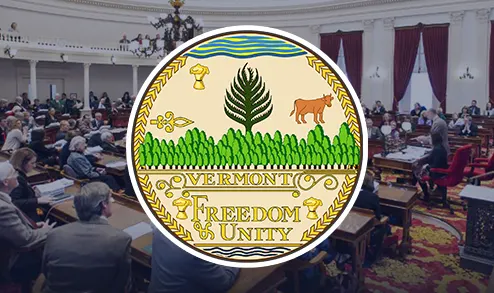 On Wednesday, the Vermont Senate made some minor changes to a bill seeking to legalize online sports betting within the state and gave it preliminary approval. The legislative effort would allow up to six sports betting companies, such as DraftKings and FanDuel, to operate in the state. The measure would also establish a fund to collect revenue and fees from the sports betting market, with a portion of that money going towards programs aimed at curbing problem gambling.
On Wednesday, the Vermont Senate made some minor changes to a bill seeking to legalize online sports betting within the state and gave it preliminary approval. The legislative effort would allow up to six sports betting companies, such as DraftKings and FanDuel, to operate in the state. The measure would also establish a fund to collect revenue and fees from the sports betting market, with a portion of that money going towards programs aimed at curbing problem gambling.
Vermont Senate Introduces Amendments to the Sports Betting Legislation
On Wednesday, the Vermont Senate gave preliminary approval to a bill seeking to legalize online sports betting in the state after making slight adjustments to the legislation. During the session, experts warned Vermont lawmakers that online sports betting could be addictive and appealing to younger individuals. While presenting H.127 on the Senate floor, Sen. Alison Clarkson, D-Windsor, explained that the bill had been designed with attention to preventing problem gambling.
The Senate decided to keep the House’s recommendation of Vermont taking at least 20% of the adjusted gross revenue that sports betting operators would generate in the state each year. However, the Senate introduced amendments regarding the operating fees that the state would charge each company.
The Senate bill proposes charging each operator a $550,000 fee once every three years, while the House suggested charging operators an annual fee based on the number of other companies in the market. The proposed fee would range from $550,000 a year for one operator to $125,000 a year for six operators.
According to Sen. Thomas Chittenden, D-Chittenden Southeast, the Senate Finance Committee hopes the proposed change would encourage sportsbooks to operate longer in Vermont. He also said that increasing fees for more companies could generate additional revenue for the state.
The Joint Fiscal Office estimated that the state would rake in around $2 million in revenue from legal sports betting in the 2024 fiscal year. The revenue would increase to roughly $4.5 million to $10.5 million in 2025, and start declining by around $10 million annually after that.
The Bill Provides for Hefty Fines on Unlicensed Sports Betting Platforms Operating within the State
Some lawmakers were worried that Vermont could be flooded with sports betting ads, which has happened in other states. To address this concern, the House Ways and Means Committee proposed a cap on the sports betting ad spending.
However, the Economic Development, Housing and General Affairs Committee, including Senator Clarkson, believed it was best not to be too strict with agreements between the state and operators regarding advertising plans. As a result, the Senate has agreed to remove language from the House version of the bill that would limit sports betting operators’ advertising spending.
Under the provisions of the legislation, sports betting marketing materials should not target individuals under 21 years old. The bill also seeks to prohibit sports betting operators from advertising their services near college campuses.
An amendment to the bill introduced by the Senate Judiciary Committee on Wednesday doubles the fines the state would impose on operators who run unlicensed sports betting. For a first offense, operators would pay a fine of $50,000. The fine for a second offense would be $150,000, and $300,000 for subsequent violations.
If the bill becomes law, it is expected that Vermont will have a legal sports betting market by January 2024.